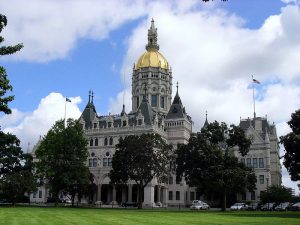April 18, 2017
Science Fellows Coming to State Legislatures Across the United States
Posted by Timia Crisp
Editor’s Note: The following guest blog is written by Rebecca French, Director of Community Engagement at the Connecticut Institute for Resilience & Climate Adaptation (CIRCA) and former AGU Congressional Science Fellow
On February 16, 2017, the California Council on Science & Technology (CCST) announced planning grants for nine states to start science policy fellowships modeled on their successful program in California. The nine states include my home state of Connecticut as well as Alaska, Colorado, Idaho, Massachusetts, Michigan, New Jersey, North Carolina, and Washington.
Each year since 2009, CCST has placed 10 Ph.D.-level scientists and engineers in the California State Legislature for one year to provide scientific perspectives and expertise in a similar position to full-time legislative staffers. The California program was modeled on the federal-level Congressional Science Fellowships, like the program sponsored by the American Geophysical Union, where Ph.D.-level scientists and engineers are placed in the United States Congress.
As an alumnus of the AGU Congressional Science Fellowship (2011-2012), I know firsthand the value that these programs bring to both the policymakers and the fellow. In the U.S. Congress, there is only one member who has a doctorate degree in the sciences. There are very few staffers of members of Congress who hold advanced degrees in the sciences. Science fellows bring their individual expertise in their respective disciplines, but also an understanding of the culture and process of science both of which come into play when developing policy for science and policy based on science.
At the state level, there is an even greater need for science and technology experts. Whereas the U.S. Congress has access to the nonpartisan Congressional Research Service, which employs many experts in all subjects to write reports on policy issues at the request of policymakers, most state legislatures do not have access to the equivalent service. State legislators employ many talented legislative researchers, but at least in my home state of Connecticut, the Office of Legislative Research has not regularly employed Ph.D.-level scientists and technologists.
To fill this need for science and technology expertise at the state level, CCST partnered with their primary funders, the Gordon and Betty Moore Foundation and the Simons Foundation, to provide planning grants to start state programs across the country. As a former science fellow, I jumped at the chance to help launch a program in the Connecticut state legislature. When I heard about the grant opportunity, I teamed up with the Connecticut Academy of Science and Engineering, essentially the equivalent of the National Academy of Sciences at the state level, to develop a program in Connecticut. This is no easy task. We must build up a new fellowship program from scratch, which includes everything from building a relationship with the state legislature to convincing them to host a fellow to raising funds to cover a competitive post-doctoral fellowship salary to creating a strategy to recruit and mentor fellows.
As the state grantees begin their one-year planning process, I encourage you to check out the CCST page where they will be tracking the planning grantees across the country. If you want to get involved, please reach out to the state’s grantee lead, which can be found here. Finally, in a year, if all goes well, consider applying to be part of the first cohort of the new science policy fellowship in a state legislature near you. In this time where science is under increasing pressure to engage with policy, these programs will offer scientists and engineers a seat at the table where no seat existed before. I hope that you will join me to take up the challenge to make this possible.
Resources:
To learn more about the State Fellowships Planning Grant recipients, check out http://ccst.us/beyondca/statefellowships/
To learn more about the AGU Congressional Science Fellowship, please visit http://sciencepolicy.agu.org/congressional_fellows/



